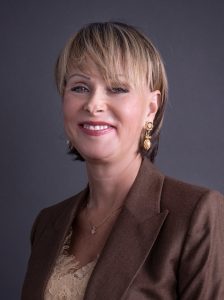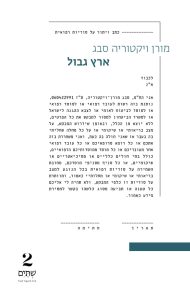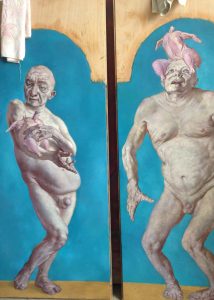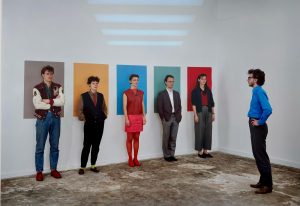English Follows Hebrew
התחושה שאין משהו שדחוף לומר אותו משותפת לרבות מהעבודות בתערוכת בוגרות/י התואר השני בבצלאל. ההצבה של התערוכה טובה, ומבין 18 עבודות הבוגרים אין ולו אחת שמביכה. העבודות מקצועיות ומהוקצעות היטב. הטקסטים הנלווים משתמשים במושגים ה”נכונים” אבל אומרים מעט מאד, בדיוק כמו העבודות שהם מלווים.
בטקסט התערוכה תארו אוצריה, פרופ‘ דור גז והדס מאור, את תכנית לימודי ה MFA כעוסקת, בין השאר ב”מגדר והגזעה, היבטים פוסט קולוניאליים בהקשרים גלובליים ולוקאליים קריאה מחודשת של אתוסים היסטוריים ועוד”. ועל התערוכה כתבו “חלק מהעבודות בתערוכה עוסקות בסוגיות סוציו פוליטיות הקשורות באופן ישיר להגדרות של זהות, בית, מולדת, היסטוריה משפחתית ותולדות המקום. …אחרות מתמקדות בזיקה שבין הגוף לבין המרחב שבו אנו חיים, או מציגות שאלות שונות הקשורות בקיום העכשווי…, על שרשרת מגבלות התנועה, צמצום המגע הבין-אישי ובה בשעה, טשטוש המרחב האינטימי”.
תחת המטריות הרחבות והאופנתיות האלו יכולה להצטופף כמעט כל עבודת אמנות באשר היא.
לטובה בולטת עבודת הוידאו Nexus (מערך קשרים) של אלנה צ’רטי שטיין. העבודה מורכבת
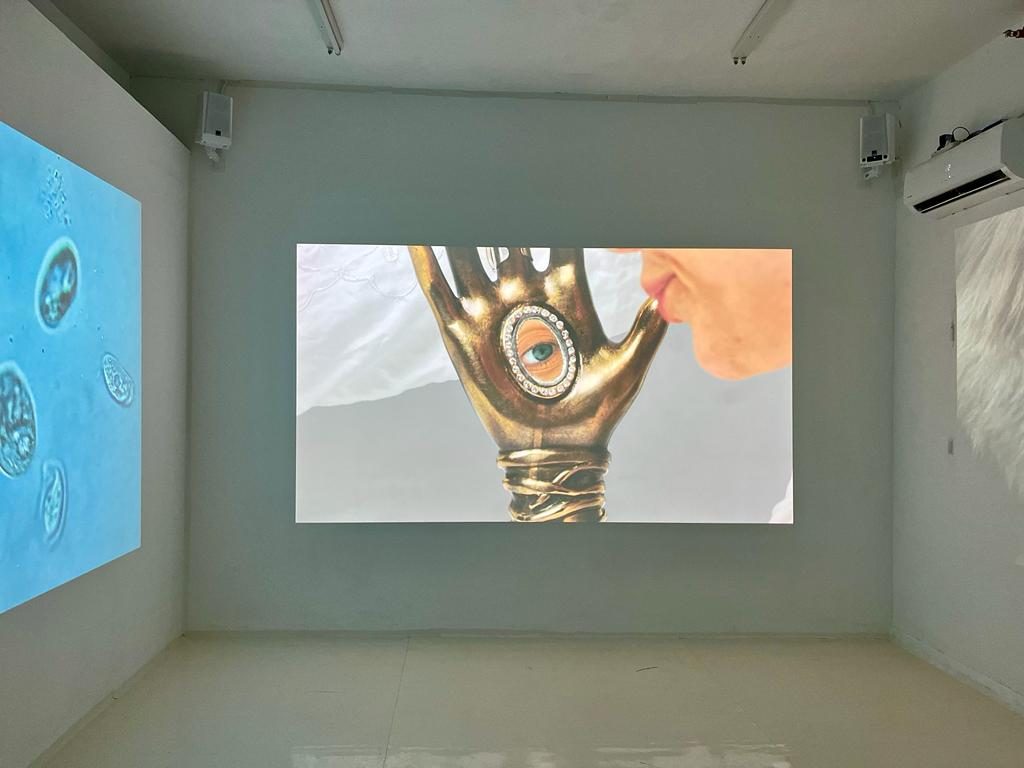
Nexus 2022
משלושה מסכים עליהם מוקרנים בלופ רצף דימויים שיוצרים נרטיבים של מסע פנימי לגוף, מסע בתולדות אמנות לדימויים שחלקם אייקוניים כמו העבודה VOLTAGE של דורותיאה טנינג מ 1942. העבודה מוקדשת לאימה של האמנית שהלכה לעולמה לפני חודשים אחדים ועוסקת במחקר מיקרובים –החיידקים, הפטריות והנגיפים, המתקיימים באופן טבעי בגופם של
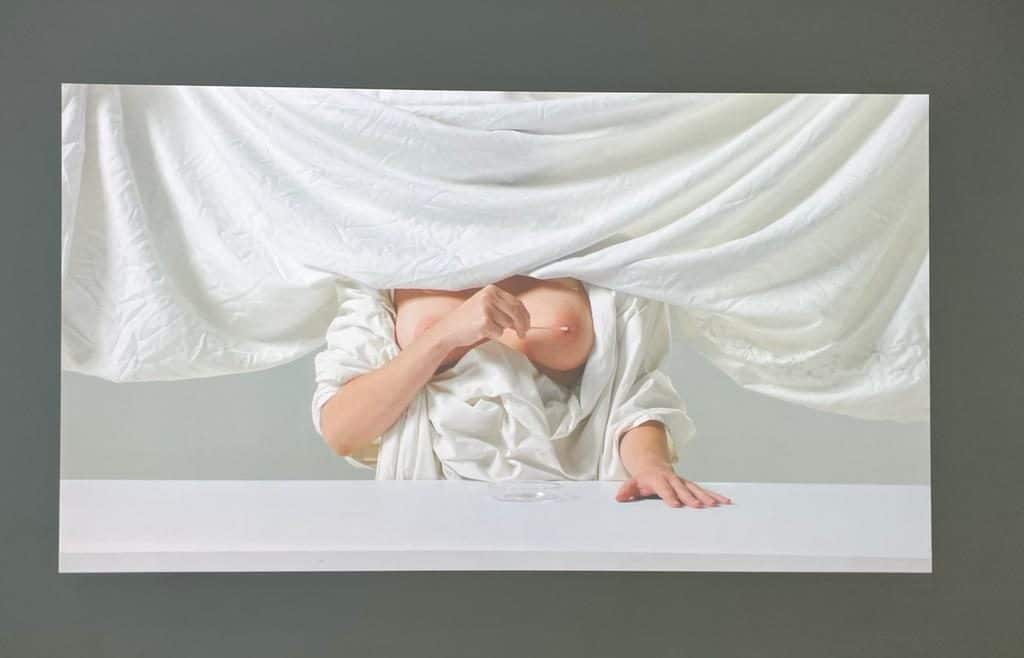
Nexus 2022
אורגניזמים. הנושא הוא החיים עצמם כמערכת שנותרה גם בלתי מובנית מקסימה ולעיתים מביכה. רצף הדימויים המלוטשים

, מבול המידע שמועבר בקול של האמנית עם מוסיקה של יחזקאל רז מותיר תחושה של חיפוש ותהיה . היא מזכירה את העבודה הנהדרת Grosse Fatigue (העייפות הגדולה) של Camille Henrot הצרפתיה מ 2013 שעסקה בפנורמה אינציקלופדיסטית של חיים והיסטוריה.
מדובר באמנית עם אופק עשייה יוצא דופן שאני עוקבת אחר עבודתה כבר שנים אחדות. די לחשוב עד כמה העבודה שונה מתערוכת היחיד המצוינת של צ’רטי שטיין Habitus בגלריה p8 ב 2021 (אצרה הדסה כהן) https://www.smadarsheffi.com/?p=14290
“השמש הקופחת”, עבודת וידיאו של עיסא גרייב מצוינת. גרייב מפרק את הסרט “מאבק בוואדי” של יוסף שאהין,
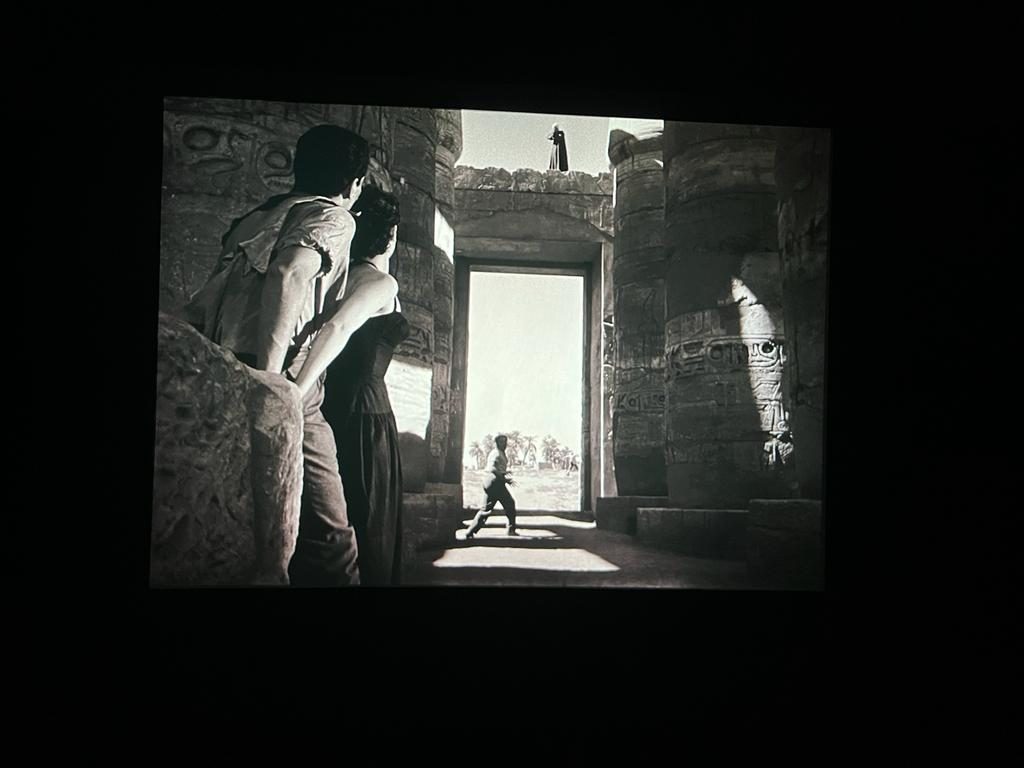
The Blazing Sun
2022
שצולם בלוקסור ב 1954. האתר הארכאולוגי המדהים (המילה הולמת במקרה זה ) יוצר מצב בו זיכרון סרטים עם תפאורה ממוצאת כמו “עשרת הדיברות” של ססיל דה- מיל מ 1923 מתערבל עם מציאות, ובניית מיתוס. השימוש של שאהין בארכאולוגיה הממשית, כמצרי מודרני המבקש ליצור גשר בינו לבין העבר שונה מהותית מפנטזיה מערבית על העבר של מזרח ובכל זאת הדמיון נוכח בעוצמה. המשחק מציאות דמיון התרחש בסרט בו השחקנים עומר שריף, בהופעה קולנועית מוקדמת ופאתן חמאמה, כוכבת מצרית הכירו בסרט, התאהבו והיו לזוג הראשון של הקולנוע המצרי.
בעוד הסרט מאציל מהעבר על ההווה גרייב מבקר התבוננות זו ומערער על תוקפה. בישראל, בה ארכאולוגיה מעצבת את ההווה (עיר דוד בירושלים וההבניה הנרטיבית סביבה היא דוגמא מובהקת) אי-אפשר לצפות בעבודה בלי להרהר בסכנות של מתיחת אנאלוגיות היסטוריות.
המיצג “ללא כותרת” של גליה פבליצ’נקו מענין ויש בהחלט הימור בבחירה להציגו כעבודה בתערוכת בוגרים. פבליצ’נקו מכניסה את הצופה לחדר לבן ערום ומספרת סיפור הגירה, ספק אישי ספק גנרי, ללא תפאורה כלשהי. כוחה של העבודה נסמך על הקשב, הקשר שייווצר בינה לבין הצופה. כמיצב, כלומר ללא נוכחות האמנית כשרק השלט “אני מזמינה אתכן.ם להיכנס ולסגור את הדלת” הוא אולי מעניין לשיחה אך לא כחוויה .

Faded Memory
2022
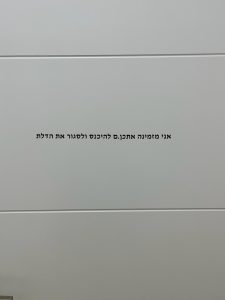
Untitled
2022
“זיכרון דהוי”, המיצב של רונן זן עוסק במשפחתו הדרוזית החצויה בין ישראל וסוריה ובאביו שנפצע במלחמת לבנון כחייל ישראלי. העבודה היפה והבולטת בו היא צילום פרק והדפיס במדפסת ביתית שהדיו בה הלך ואזל. העבודה היחידאית הזו, השברירית שאקראיות מעצבת את נראותה מצליחה להעביר מורכבות וצער. איכות מסוימת קושרת אותה לעבודות המעניינות של שחף לוי שיצר צקלוס ציורים בשם מים כבדים המתארים אסון שהוסתר מהציבור והתרחש בכור בדימונה. סבו של לוי, יחד עם עובדים נוספים נספו כתוצאה מקרינה. בציורים בתרסיס צבע על בד שמזכירים ציורי גיבורי ב Airbrush . לוי, יקירה אמנט, בציורי פחם גדולים במיצב “בוץ ועשן”, ואלינור סאם במיצב ציור ומוסיקה, מתבלטים כאמנים שיהיה מעניין לעקוב אחר התפתחותם.
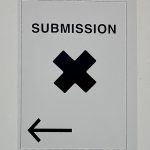
Submission
2022
את התערוכה סוגרת (או מכתירה) העבודה של אלנה שטלצר Submission המורכבת מחוט תיל מגולוון מתוח לכל רוחב 41 המטרים של הבניין. החוט מעוגן לבניין בתיבות מתכת. לעבודה מידה עוצמה ופואטיות , ניסיון לסכם, לאסוף ולחבר ומשתבר על הכותרת שפירושה “כניעה”. הכותרת מנתבת את הקריאה לקשירה אלימה ולגדר וכך הופכת את העבודה, היפה בפני עצמה, לפשטנית שלא בטובתה.
האקדמיה של החלון – הרצאות ד”ר סמדר שפי בזום.
מרלן דומא –
לרגל תערוכת הענק שלה בפלאצו גראסי, ונציה
יום ב, 30 מאי 2022, ב 19:30
לינק לרישום ופרטי תשלום
https://forms.gle/YebuuBNDfk2TvA1V9
תערוכת היחיד של מרלן דומא “open-end” מוצגת בפלאצו גראסי בוונציה במקביל לביאנלה. תערוכת הענק ובה מעל מאה עבודות שנוצרו בין 1984 לשנה האחרונה היא נקודת המוצא להרצאה על האמנית הנחשבת לאחת היוצרות העכשוויות המובילות והמשפיעות בשדה הציור הבינלאומי (לרבות הישראלי).
אהבה ומוות, מגדר גזע, תמימות ואשמה, אלימות ועדינות מופיעות בעבודות הנסמכות בעיקר על צילומי פולרואיד שלה ושל אחרים, דימויים מהתקשורת ומפורנוגרפיה ותולדות האמנות.
האמנית ילידת דרום אפריקה החיה ופועלת בהולנד מאז שנות ה80 אמרה פעם על עצמה ” אני אמנית שמשתמשת בדימויים מיד שניה וברגשות יד ראשונה”.

Bezalel MFA, 2022
The feeling of having nothing urgent to say is common to many of the Bezalel graduates’ exhibits. The works are well-installed, not a single embarrassing work present, all are professional and well-polished, while the accompanying texts use the “correct” terminology yet say very little – just like the lackluster artworks on view.
The curatorial text by Prof. Dor Guez and Hadas Maor described the MFA program as engaged, among other issues, in “gender and racism, post-colonial aspects in global and local contexts, a renewed reading of historical and other ethoses.” About the exhibition they wrote that “Some of the works in the exhibition engage in sociopolitical issues directly linked to the definition of identity, home, homeland, family history, and local history…others focus on the association between the body and the space in which we live, or pose various questions associated with contemporary existence…about the chain of limitations on movement, reduction of interpersonal contact, and simultaneously, blurring of the space of intimacy.”Nearly all art can be subsumed under these broad, fashionable statements.
Standing out is Elena Ceretti Stein’s three-channel video work Nexus, 2022, looping a continuous stream of images creating narratives of an internal journey into the body, a journey through art history to images some of which are iconic, such as Dorothea Tanning’s 1942 painting Voltage. The work is dedicated to the artist’s mother who passed away only a few months before the exhibition, who was engaged in research on microbes, bacteria, fungus, and viruses existing naturally in the body of organisms. The subject is life itself as a system that remains captivating and often confusing even if never fully understood. The highly finished images, and the flood of data transmitted by the artist’s voice with music by Yehezkel Raz in the background, evokes a feeling of a quest , a search. It is reminiscent of the wonderful Grosse Fatigue (2013) by French artist Camille Henrot that engaged in an encyclopedic panorama of life and history. Ceretti Stern is an artist with an unusually broad approach to art-making whose work I have been following for several years. It is sufficient to see just how different this work is from her excellent solo show “Habitus” in 2021 at the P8 Gallery (curated by Hadassa Cohen) reviewed on www.smadarsheffi.com/?p=14290

Nexus 2022
Essa Grayeb’s video The Blazing Sun (2022) is excellent. He deconstructs Youssef Chahine’s film Struggle in the Valley/Blazing Sun filmed in Luxor in 1954. The splendid architectural site creates a situation in which the memory of invented backdrops as in Cecil B. DeMille’s 1923 Ten Commandments blends with reality to build myths. As a modern Egyptian, Chahine’s use of actual archaeology seeking to create bridge to the past is fundamentally different from the Western fantasy of the past of the East. However, memory is still present in full force. The play of reality/imagination took place in the film in which actors Omar Sherif in an early role, fell in love with film star and Faten Hamama, and the two became the “first couple” of Egyptian cinema.

The Blazing Sun
2022
While the film took from the past to apply it to the present, Grayeb criticizes this viewpoint and challenges its validity. In Israel, where archaeology shapes the present (City of David in Jerusalem and the rebuilding of a narrative around it is a clear example), it is impossible to view the work without contemplating the dangers of creating historical analogies.
Galia Pavlichenko’s installation Untitled, is interesting and bears definite humor in its presentation in a graduates’ exhibition. Pavlichekno brings visitors into a bare white room where she tells an emigration story, which may be personal or generic, without any scenery whatsoever. The power of the work rests on attentiveness, on the connection created between artist and viewer. As an installation, without the presence of the artist, with only a sign stating, “I invite you to enter and close the door,” is perhaps interesting for a conversation but not as an experience.

Ronen Zien’s installation, Faded Memory, engages in his Druse family, split between Israel and Syria, and his father, wounded in the Lebanon War while an Israel soldier. This beautiful consists of a photograph he split into sections and printed on a home printer which was running out of ink. This unique, fragile work, its visibility shaped by chance, succeeds in conveying complexity and sorrow. A certain quality links it to the interesting works by Shahar Levy who made a painting cycle called “Heavy Water,” depicting a disaster that took place at the Dimona Nuclear Reactor and was kept secret from the public, an incident in which Levy’s grandfather was killed by radiation along with others. The airbrush paintings on canvas are reminiscent of paintings of superheroes. Levy, Yakira Ament with her large charcoal drawings in the installation Mud and Smoke, and Elinor Sahm in her painting and music installation, show themselves to be artists whom it will be interesting to follow their development.
The exhibition’s closing (or crowning) is Elena Steizer’s Submission, comprised of galvanized barbed wire stretching over the building’s entire 41 meters, anchored to the building with metal housings. The work is on a powerful and poetic scale, an attempt to gather, connect, and shatter in “submission.” The title directs the reading to violent binding and fencing, thus making the work which is beautiful in and of itself into something simplistic, which does it no good service.
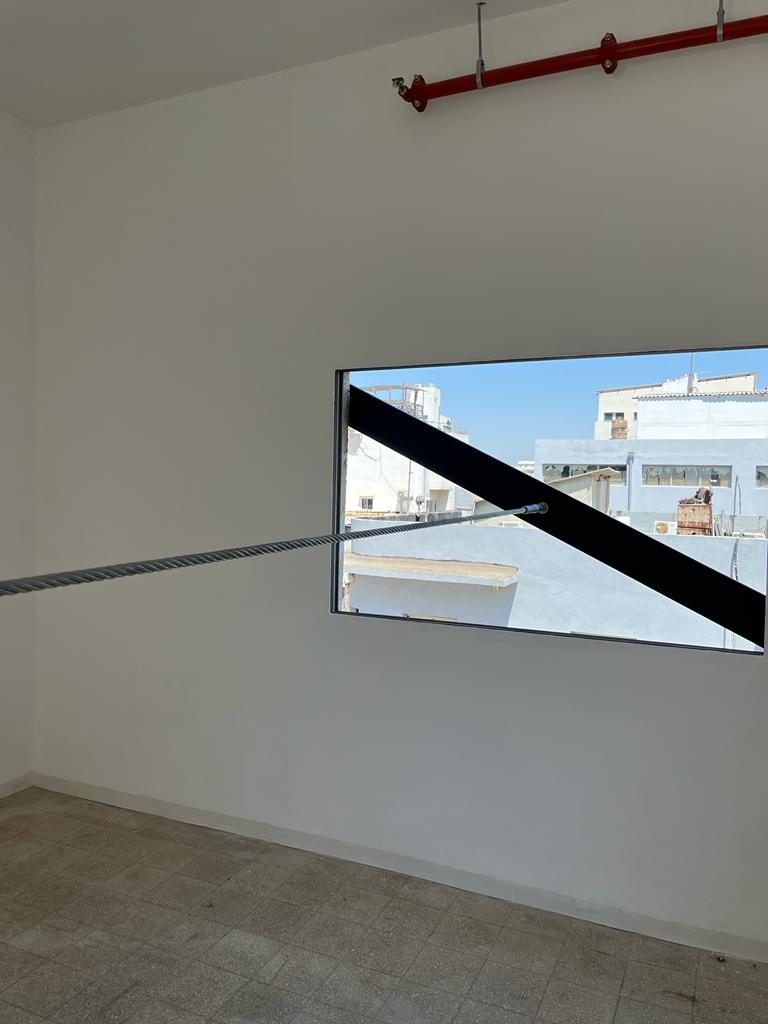
Submission
2022

